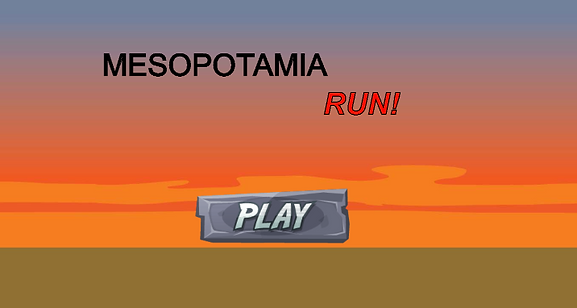
A fun game about Mesopotamia (click to play)
If it weren't for the Sumerians’ creativity, everyone would be walking from place to place and eating on the floor. If not for the Assyrians, we would know nothing about warfare. Without Babylon, we would not have a working civilization. Those living in Mesopotamia shaped the very way we live today, and the landscape provided for them. It affected their daily lives, the trade, and even war. Our lives would be uncivilized and dull if it weren’t for the “land between two rivers.”
First of all, the landscape in Mesopotamia affected their daily lives. The Mesopotamians ate a variety of fruits, vegetables, berries, meats, and grains. According to the Oriental Institute, the Mesopotamians ate all kinds of crops, meats, and wild plants. They most likely had to trade to attain such a wealth of food. Their homes were made of clay and mud bricks. According to the book “Ancient world,” the Mesopotamians built their houses from adobe and clay. The houses were usually three stories high, and sometimes had a room which is like a miniature pasture. They used the fertile land to grow food easily. According to Mr. Donns, they were agriculturally rich because it is easy to grow food in Mesopotamia. This is because Mesopotamia is in the Fertile Crescent.
Secondly, the landscape affected trade. This is because of the goods that are produced in Mesopotamia, and the location of good suppliers. According to the British Museum, they had to trade with bordering countries and one of their own city-states, Babylon. They exported several types of foods, including grains; meat; and vegetables, and imported precious stones and metals. They travelled on foot, donkey, and boat.
Finally, the landscape in Mesopotamia affected warfare. The fall of most of Mesopotamia was caused by one of their own city-states, Assyria. According to Mr. Donns, the Assyrians took over nearly every civilization they fought. Similar to trade, the Mesopotamians fought against themselves (mostly the Assyrians, out of fierceness. This resulted in the fall of the other Mesopotamian city-states.), and bordering countries. From prior knowledge, I would think that the varied terrain would give them an advantage, knowing every nook and cranny the enemy might be hiding.
In Mesopotamia, the landscape affected daily life, trade, and warfare. When Mesopotamia thrived from this helpful landscape, it brought the entire human race up. This fortunate civilization became the very core of all that is civilized. Even though they were eradicated thousands of years ago, everywhere you turn your head, you see the work of Mesopotamia.
